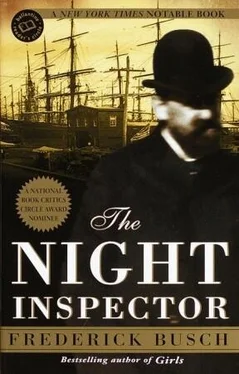I found a strayed mare, on which we carried tarpaulins and blankets and food, rather early in my association with Sergeant Grafton when we were moving down through southern Pennsylvania. I sat back against a tree as he shouted at Burton and as Sam Mordecai went trotting off with a resoluteness I found charming, since he’d no idea where he should seek the horse.
The sergeant shouted, “Bartholomew, you lazy bugger assassin!” But I merely smiled and pulled my hat low upon my head and closed my eyes.
I opened them, only seconds later, and I called to him, “The fruits of my catnap, Sergeant. She’s in a grove of plum trees.”
He walked over and cut a chew of tobacco for himself and inserted it into his mouth. Then, around it, he said, “Specifically plum?”
“I do know a plum tree when I see one.”
“And you saw one.”
“Yes.”
“Yes, Sergeant, goddamn it, Bartholomew. Stand up and give me a goddamned report!”
“Sergeant, the lazy bugger assassin”—and he began to smile—“reports that he dreamed of seeing the runaway mare in a grove of plums.”
“I’m going to send Burton, on the strength of your dream, to look for plum trees. Is that what you suggest?”
“It is.”
“And I’ll never doubt you again, I suppose.”
“I suppose you’ll try, Sergeant. But you’ll wonder.”
He spat some tobacco juice between my feet. When he looked up, he was grinning. “Did you see me swallow any of this and choke to death?”
“I’m willing to be patient,” I told him, and he began to sputter into a laugh.
Of course, we found the horse, and in a grove of trees that Burton thought, though he couldn’t be sure, were plums.
It wasn’t until we were pretty far south, halfway through the Carolinas, that I dreamed the dream about the woman and woke, shouting, to terrify Grafton and Burton and bring Mordecai running over from where he’d mounted watch. The night was cold and wet, heavy rain on everything for hours, and we were soaked and miserable to start with. We had rolled into our blankets and covered ourselves with tarpaulins because we hadn’t the grit, nor had Grafton the heart to order us, to make shelters with rope and tent halves, using the low limbs of slender dogwoods, the only trees near where we had stopped.
“Are you drunk, Mr. Bartholomew?”
“No, Sergeant, and I wish I was.”
“You were dreaming?”
“I’m afraid so.”
“Because? Afraid because? Go back to your watching, Mr. Mordecai. Wake Mr. Burton in two hours and see if you can sleep. If not, find a way to make a fire in a rainstorm and I’ll put you in for medals. Mr. Bartholomew? Why afraid?”
“Because of what I dreamed.”
He slid down into his blanket and tarp and he rolled over. He murmured, “Which was?”
I slid down in my own blanket roll and pretended not to hear. I did hear his voice again, but I ignored it. He was snoring soon enough, as all soldiers learn to do, in rain or snow or landslide of mud or manure: Stop, do the necessaries, close your eyes, and sleep.
I tried to keep my eyes open in the cold and soak and darkness, for I did not want to live inside that dream again. I blinked myself awake a few times, but then I could not help but fall — as if down a cliff face or into a mining pit, for thousands of yards, and at great speed — into sleep. I was not invaded by the dream again, although I thought of it at once on waking, and left the camp, as if to relieve myself, because I did not wish to speak of it in any particulars. Fortunately, Sergeant Grafton was too uncomfortable and moody to demand an accounting of my nighttime vagaries.
I had dreamed of a tall woman in a dress the color of trilliums, that clean whiteness, who wore a gauzy cloth in her hair that matched the dress. Her arms were long, and I could see, as the light cloth was pressed against her by a wind, that her thighs were long as well. She had a long face, a long, straight nose, and a very wide mouth. Her throat was long, too, and it was arched, strained, as if she tried to hear. It was me, I thought in the dream. She was trying to listen for me, for she knew that I was on my way. She hadn’t the face of anyone I knew, but it was a face to which I was powerfully attracted, and I coveted her body, thinking that I would spare her if she would lie down with me.
How wrong, I said in the dream, to kill her if she doesn’t.
I was drenched, then, in someone’s dark saliva. I smelled a stink, as of manure. But it was tobacco, of course, and Sergeant Grafton was passing along the lieutenant’s instructions, handed down from the brigadier to the colonel to our lieutenant to Grafton, and then, in their vileness, to me. I choked at the smell. She turned, as if she’d heard me gasp.
I stared at her, stared into her dark, intense eyes. I ran my eyes like fingers along the frown marks at her mouth, etched beneath her tan. She nipped at my fingers, as if to promise pleasure. I closed my eyes, then opened them, and I stared at her lips. I felt charged, and full, and then I tingled with release, and I stared and I surged, and I cried aloud, and her face exploded as if I had caught it in my sight and fired.
So I waited for a week, and then for weeks, to learn that I’d been ordered to kill a woman.
What I wish to depose here is that I never had such a presentiment about Malcolm. Learning as I did, and learning what I did, I was as staggered as his parents must have been. But that cannot be, of course. But I was, indeed, staggered. And I did feel somehow responsible. And I did say “somehow” as a cowardly begging off. You see, my mind or nighttime soul or whatever aspect of us is involved in dreaming is a part of this recollection. That is what I mean to say. For, while the articles in the New York papers were either unsigned, or not by him, the editorial piece in the Advertiser , printed in Boston and left behind at my office by a Massachusetts traveler in French writing machines (for which he wanted much and promised little), was signed by one S. Mordecai. I read it two weeks after I had read the story in The New York Times .
But it had not happened yet on the afternoon of which I speak, and it had not happened that night. “He was the same boy,” his father told me days afterward, as we sat in his office on the barge, he as inspector for the night and I as the comforting friend. The fire was high although it had been a sweltering September day, and he drank too much gin. He ran with sweat, and his tears ran with it; he was all a-glisten, and his broad workingman’s hands trembled more than I had ever seen. “He was the same boy during the day before we found him. I have been assured. He skylarked with the other clerks at the Atlantic and Great Western. He was merry. Although I must report to you, shipmate, that he sported with the pistol. You told him it was a serious weapon. You repeatedly passed the warning along, and I somberly echoed it. But he listened to neither. He was careless with it, bringing it to work, apparently, although I didn’t know, of course. I would otherwise have taken a hand.”
He sighed. “I already did — had I told you? There had been too much coming home in the late watches of the night. We had given warning. I took his key away that opened the night latch, and I told him he must be in and quiet in his room by a decent hour, nine bells. We rise early, after all, and he had work as well. For two nights, he stayed in. His uniform, you see, had just arrived, and he must try it on in the evenings, and parade for his sisters. But, then, no: out into the night, and away until dawn, and we, rising and falling like a young man’s feelings, staggering, then, through the long days’ exhaustion. So it would not do.”
Читать дальше












